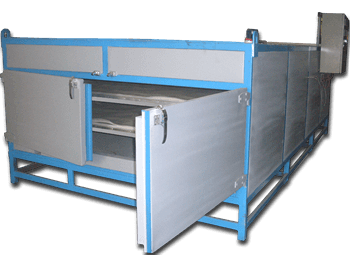Features & Specs
- Introduction
- Structure
- Operation
- Options
- Specifications
Operation
Glass Inspection
Glass is placed on an optional inspection table with fluorescent lamps lies beneath the glass. Operator inspects and makes sure the glass is clean enough for assembly.
Interlayer Cutting & Assembly

Glass is then transported to this optional assembly table with an optional interlayer rolls rack placing next to it. Several rolls of popular interlayer are stored on the rolls rack. Required interlayer is unrolled and lay flat on the glass. Second piece of glass, after inspection, is put on top of the interlayer. The two pieces of glass is aligned in proper position. It is then cut in requested size. If multiple layers of glass and interlayer are required, the assembly cycle is repeated.
Glass Loading
Silicon blankets are at glass carts. Top silicon blanket are unseal from bottom silicon sheet. Well-assembled laminated glass is loaded on bottom silicon sheet. If more glass is placed within the same blanket, repeat the loading. Top silicon blanket is then seal and lock with bottom sheet around four edges. Top silicon blanket slides from cart into oven. Upper deck of glass cart folds downward. Glass loading is repeated at lower deck silicon blanket. Bottom silicon blanket then slides from cart to oven. Silicon tubes are connected to vacuum metal pipe which runs to vacuum pump. Door is then closed.
Vacuum
Vacuum is turned on while heating remains off. Air is started to remove in between top and bottom silicon sheets at room temperature for a certain while. Vacuum is kept running all the time during heating until glass is cool enough for unloading.
Heating
The rising, steady and lowering of temperature and corresponding timings are set up in control console. If a pre-set parameter is found useful for this batch, the parameter is easily taken out from memory and is applied. When vacuuming at room temperature is done, temperature begins to rise up according to set value. Then temperature is kept for certain time duration according to set value. It is then lowered down to set value according to set value. All temperatures and timings are activated automatically and operator is free when oven is being heated up.
Cooling
When heating is completed, heating elements are shut down. Door is opened to allow fast cooling. Additional fan blower (to be provided by buyer) could be helpful to speed up cooling. If necessary, silicon blankets slides out of oven onto glass cart and are left for cooling outside of oven when high efficient of cooling is required.
Glass Unloading
When laminated glass is cool enough, glass cart is pushed close to oven. Bottom and top silicon blanket slides out of oven onto glass cart. Well done laminated glass is then unloaded.
2nd Glass Cart
While glass is being heated inside oven, glass is loaded on another two silicon blankets on 2nd glass cart. When first two silicon blankets slide out of oven onto 1st cart, 2nd cart with #3 and #4 silicon blanket are pushed close to another door of oven. #3 and #4 silicon blankets slide into oven. Doors are closed and production cycle is repeated. This design fully utilizes oven and doubles production capacity.